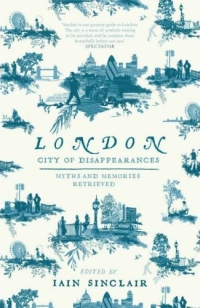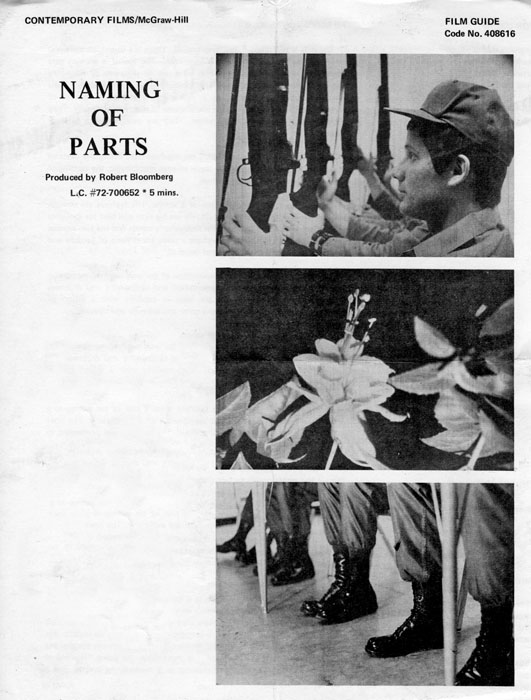|
|
Documenting the quest to track down everything written by
(and written about) the poet, translator, critic, and radio
dramatist, Henry Reed.
An obsessive, armchair attempt to assemble a comprehensive
bibliography, not just for the work of a poet, but for his
entire life.
Read " Naming of Parts."
|
Contact:
|
|
|
|
Reeding:
|
 |
I Capture the Castle: A girl and her family struggle to make ends meet in an old English castle.
|
 |
Dusty Answer: Young, privileged, earnest Judith falls in love with the family next door.
|
 |
The Heat of the Day: In wartime London, a woman finds herself caught between two men.
|
|
|
|
Elsewhere:
|
|
Posts from October 2006
|
|
|
27.4.2024
|
An intriguing e-mail from a visitor appeared in my inbox this morning, regarding a cameo appearance of Reed in a newly-published book, London: City of Disappearances, edited by Iain Sinclair ( London Times review). The book is a collection of myths and mysteries of a London lost to time — stories of disappearing people, streets, pubs, and occupations — with contributions from J.G. Ballard, Marina Warner ( Guardian excerpt), Will Self (Penguin extract), Alan Moore, and Michael Moorcock.
Reed materializes in "Death of a Cleaner" by Richard Humphreys, 'a portrait of a mysterious character called Antony Ashburner.'
There is a mysterious and evocative poem by the Birmingham poet Henry Reed, called "Chrysothemis," which gives an insight into Ashburner's life in the Second City [i.e. Birmingham]. After his death I found a galley proof of the poem in his [Ashburner's] untidy flat at the wrong end of Ladbroke Grove. There was a dedication handwritten in ink: 'To Antony from Henry December 1942.' The poem is darkly Eliotic and casts light on an important if brief relationship...
The poem in question first appeared in John Lehmann's wartime anthology New Writing and Daylight (Winter 1942-1943), and is a long monologue in the voice of Chrysothemis, the passive sister of vengeful Orestes and Electra, children of Agamemnon and his murderous wife, Clytemnestra. Lengthy excerpts from the poem appear in Harvey Gross's metrical study from Sound and Form in Modern Poetry (1964).
Many thanks to John for alerting me to this! I can't wait to get a hold of a copy of City of Disappearances.
|
1537. Radio Times, "Full Frontal Pioneer," Radio Times People, 20 April 1972, 5.
A brief article before a new production of Reed's translation of Montherlant, mentioning a possible second collection of poems.
|
Two curious snippets turned up in Google Book Search today. The first is from Red Letter Days: British Fiction in the 1930s (Croft, 1990), and mentions several of Reed's contemporaries in Birmingham:
...Reggie Smith, a Communist and an old school friend of [Walter] Allen's. As an undergraduate at Birmingham University, Reggie Smith had published Allen's first work in the student magazine Mermaid, together with material by their friend Henry Reed and by Robert Melville.
A tidbit also appears in, of all places, Selections from Freedom, articles selected from the Freedom, the Anarchist Weekly (London). It appears to be a letter signed by many prominent writers and artists of the time, protesting conditions still to be found in Spain in the early 1950s: 'We insist that the Government of General Franco be obliged to honour the pledges which it gave on joining [ UNESCO].'
Lots of familiar names rally in support, including Reed, Laurie Lee, Hugh MacDiarmid, William Plomer, Sacheverell Sitwell, and Stephen Spender.
|
1536. L.E. Sissman, "Late Empire." Halcyon 1, no. 2 (Spring 1948), 54.
Sissman reviews William Jay Smith, Karl Shapiro, Richard Eberhart, Thomas Merton, Henry Reed, and Stephen Spender.
|
Reeding Lessons is proud to present " Naming of Parts," a film by Robert Bloomberg, based on the poem by Henry Reed. Click to go to video:
Produced in 1971 as a student film at San Francisco State University, Bloomberg's "Naming of Parts" won the Student Peace Prize at the 13th annual American Film Festival. Subsequently, it was picked up for distribution as an educational film. From "Poetry and Film for the Classroom" ( English Journal, January 1977), a "highly selected checklist of some of the best films made from poems":
Naming of Parts (Contemporary/McGraw-Hill, 5 min., black and white, 1972). Henry Reid's [sic] poem about a soldier daydreaming during a demonstration/lecture on the naming of the parts of his rifle is presented visually through the eyes of the man. The officer conducting the lesson talks about the weapon and death, but the soldier's thoughts are on nature, sex, and life.
If you prefer a direct, non-Flash link, here's the full version (50MB MPEG file, lengthy download).
|
1535. Reed, Henry. "Talks to India," Men and Books. Time & Tide 25, no. 3 (15 January 1944): 54-55.
Reed's review of Talking to India, edited by George Orwell (London: Allen & Unwin, 1943).
|
Something which I had disregarded ages ago has raised its head, again. A year or two back, I had come across an entry for what looks like a dissertation or monograph called Literature Reflecting the Spirit of an Age: A Study of M. Arnold, T.S. Eliot and H. Reed. I can't even remember where, or how, I had turned it up.
I quickly disregarded it as a lead, however, when I peeked at the record in OCLC: Jidai seishin no naka no bungaku. It clearly lists the subjects as Matthew Arnold, Thomas Stearns Eliot, Herbert Edward Read.
But this week, I was perusing the old, print volumes of the Annual Bibliography of English Language and Literature ( ABELL, if you're lucky enough to be a subscriber), and there it was again. In the volume for 1994, in the index under "Reed, Henry":
Yoshimura, Akio. Jidai seishin no naka no bungaku M. Arnold, T.S. Eliot, H. Reed wo megutte. (Literature reflecting the spirit of an age: a study of M. Arnold, T.S. Eliot and H. Reed.) The book is, obviously, in Japanese, and my Babelfishing of "H. リードをめぐって" has only left me with "centering on lead/read," which is less than illuminating. Here's the publisher's webpage, and the " translation." Do you think that's "led, red," or "leed, reed?"
One of the only library copies of the book I can see is at Waseda University, Tokyo (and, I assume, this is where the OCLC record comes from). Rikkyo University's OPAC even lists the title with the subject "Arnold, Thomas." The book does, however, still appear to be available through Amazon.co.jp, but that doesn't help break the chain of what may be a cascade failure of translation. Hello, Tokyo?
|
1534. Reed, Henry. "Radio Drama," Men and Books. Time & Tide 25, no. 17 (22 April 1944): 350-358 (354).
Reed's review of Louis MacNeice's Christopher Columbus: A Radio Play (London: Faber, 1944).
|
Will this labor ever be finished? Complete? Will there ever come a day when, thumbing through the index of some quaint volume or plying the depths of some obscure database, I will suddenly discover that there is simply nothing left to discover? Not today. I am constantly amazed when I turn up Reed references which have so far managed to escape the irresistible gravity of the bibliography.
I found today's escapee as I was strolling (virtually) through the searchable database of back issues of journals at Oxford University Press, specifically Notes & Queries. Great stuff, that. (Incidentally, the 19th century stuff is online, full-text.)
Undeterred by innumerable references to Wordsworth's American editor, whose name also happened to be Henry Reed, I found this in a page of search results: 'The pages under our eye did not reveal his name, and we were content to go on guessing. (It proved to be a name new to us—Henry Reed.)'
Now, you have to have a special subscription to the Oxford University Press Journals to view articles prior to 1996. However, if you browse instead of search, the "Front matter" (table of contents) is thoughtfully provided. The article in question, " Memorabilia," happens to be on page 1 of volume 188, no. 1 (13 January 1945), and is included with the scan!
It's an unsigned article reacting to a review of Eliot's "new book," Four Quartets, which appeared in the December 9th, 1944 Time & Tide. Here's the rest of the quote:
'It does not disquiet me that there are passages in these four poems that I still do not understand, for whenever I read them, as I do often, the wonderful varied power of the language they employ holds me completely a victim, and I do not mind the uncertainties.'
When we had read as far as that, in the Time and Tide review (9 December) of Mr. Eliot's new book, we knew that here was a mind we must respect. The pages under our eye did not reveal his name, and we were content to go on guessing. (It proved to be a name new to us—Henry Reed.)
The author (whose name I may try to guess), then goes on to compare Reed's review in favor of one by E.J. Stormon, from the Winter, 1944 Meanjin Papers.
Now, I'm familiar with the journal Time & Tide, having taken an extended traipse to pursue a volume at Duke's libraries in order to obtain Walter Allen's review of Reed's A Map of Verona. At the time, I had scanned Duke's volumes looking for more of Reed's work, but this review must have slipped by. It may have been unsigned as well, as "Memorabilia"'s author suggests. And if I had to take a guess at the name of this author? Mr. Walter Allen, I presume?
|
1533. Friend-Periera, F.J. "Four Poets," Some Recent Books, New Review 23, no. 128 (June 1946), 482-484 [482].
A short review calls A Map of Verona more pretentious than C.C. Abbott's The Sand Castle; influenced by Eliot, Auden, MacNeice, and Day Lewis.
|
I went to every bookstore in town (both of them), and could not find a copy of the October Virginia Quarterly Review. Small matter. Da' Square Wheelman, over at Bicycle Diaries, does a little internet detective work, and turns up the full-text of Frost's lost poem, "War Thoughts at Home."
|
1532. Vallette, Jacques. "Grand-Bretagne," Mercure de France, no. 1001 (1 January 1947): 157-158.
A contemporary French language review of Reed's A Map of Verona.
|
|
|
|
1st lesson:
Reed, Henry
(1914-1986). Born: Birmingham, England, 22 February 1914; died: London, 8
December 1986.
Education: MA, University of Birmingham, 1936. Served: RAOC, 1941-42; Foreign Office, Bletchley Park, 1942-1945.
Freelance writer: BBC Features Department, 1945-1980.
Author of:
A Map of Verona: Poems (1946)
The Novel Since 1939 (1946)
Moby Dick: A Play for Radio from Herman Melville's Novel (1947)
Lessons of the War (1970)
Hilda Tablet and Others: Four Pieces for Radio (1971)
The Streets of Pompeii and Other Plays for Radio (1971)
Collected Poems (1991, 2007)
The Auction Sale (2006)
|
Search:
|
|
|
Recent tags:
|
Posts of note:
|
Archives:
|
Marginalia:
|
|









